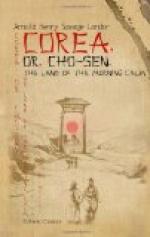It is a huge bronze bell raised from the ground only about a foot. It possesses a fine rich tone when it is hammered upon by the bell-ringer, but a good deal of the sonorousness is lost and the sound made dreary and monotonous by its being so low down. The man rings it by striking heavy blows at it with a big wooden mallet, and its first note in the early morning makes the drowsy gate-keepers of the town begin to make preparations for establishing communication once more between the capital and the outer world; while at sunset, as its last melancholy notes are blown away in dying waves by the wind, the heavy gates are closed, and every man—though not every woman, as we shall see—has to retire to his home until dawn the next morning, if he wishes to escape a severe flogging, or even the risk of losing his head. The laws and rules in this respect have not been very severely enforced of late years; yet one never sees even now a Corean male walking about the streets after dark. Though capital punishment might not be inflicted on the offender, a very sound spanking would very probably be the result of a native being caught flagrante delicto during a nocturnal peregrination. Wherefore, the Corean male is, a raison, very careful not to be seen out after dark. On one or two occasions, nevertheless, the male community is allowed a prowl by night, and seem to enjoy it to their heart’s content. The principal of these great events is the night for “crossing the bridges,” a festivity in which men and children are allowed to take part, and in the course of which they spend the whole night in prowling about the streets, and crossing over the bridges and back again. At such a time the streets are alive with story-tellers, magicians and comedians, who delight the nocturnal sight-seers with wonderful fairy-tales, jokes and fantastic plays.
A moonlight night is always chosen for the “crossing of the bridges” outing, a rather sensible precaution when one sees what the bridges are like. There are the stone supports of course, and over these huge flat broad stones on which one treads. The width of the bridges is generally about six feet, but no parapet or railing of any kind is provided for the safety of the wayfarer. Through age and weather, these stones have been considerably worn out, and are here and there disconnected, besides being slippery to an extreme degree; so that even in broad daylight, one has to keep all his wits about him, in this sort of tight-rope performance, not to find himself landed in the river down below, in which, however, there is no water running. Altogether, the days in which the men of Cho-sen enjoy liberty at night are five.
The last day of the year is probably the one when the larger crowds can be seen hurrying along through the streets, for a custom prevails among the Coreans to visit during that night and the following one, all one’s relations and best friends, congratulations and good wishes being freely exchanged and presents of sweets brought and gracefully received. New Year’s night is also a night of independence, but the greater number of the male community are so “well on” with wine-drinking and excitement, that staying at home is generally deemed advisable.




